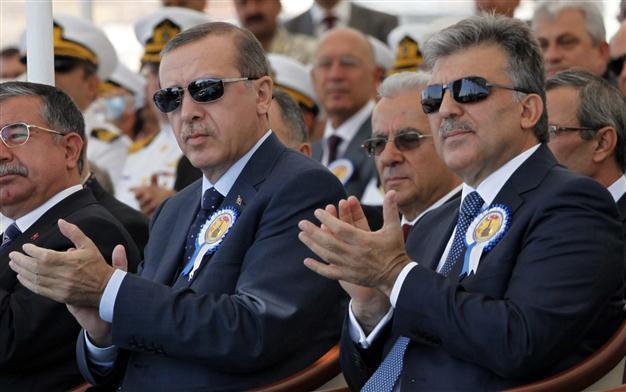AKP silently discusses amendment to statute
MEHMET ALİ BİRAND

There is a special relationship between Erdoğan and Gül that is unprecedented in Turkish politics, one that is based on solidarity. REUTERS photo
Until a short while ago, the events of the year 2014 and beyond were not really talking points. Especially during Prime Minister Recep Tayyip Erdoğan’s surgery and during his recovery, nobody dared mention it. Nowadays, it is turning into a widespread topic of debate. Political calculations are being made. In the next couple of years, it will be debated even more.The first movement started with the setting of President Abdullah Gül’s presidential term at seven years. When the law confirmed that the president was elected once and for seven years, it gave the impression that the prime minister wanted Çankaya (the presidential mansion) vacated by 2014.
Then, with the prime minister’s recovery, the situation became much clearer.
Erdoğan has never discussed the subject of the presidency. He has never even shared it with Gül, or any of his closest friends. However, be it in his body language or in his general attitude, when the topic is brought up, he has given the impression that he wants Çankaya and he has quite settled on the idea. At least, this is the impression his entourage has picked up.
Nowadays, the question that Justice and Development (AKP) party officials in Ankara ask is not: “Will the prime minister ascend to Çankaya?” All speculation on that subject is now off. Erdoğan is expected to move to Çankaya in 2014. The questions focus on other areas:
- Who will lead the party after Erdoğan? Will Abdullah Gül return to his old position?
- If Gül doesn’t return, who can replace him?
- Can the AKP win the election without Erdoğan?
- To what extent will Erdoğan continue to control the party?
- Because of the fourth-term ban in the party statute, the party’s big guns will not be elected again. Is it necessary to change the party statute so that this only applies to leaders, and not other party members?
Everybody is talking about everything nowadays. But in a short while it is obvious that all debate will focus on these questions.
Everyone is waiting. Nobody wants to say anything openly. It is as if they are waiting for a signal from the prime minister. Their concern and uncertainty can be felt openly.
Even though they are saying that the party will stand firm and continue its way after Erdoðan, the situation has not been completely digested. Nobody knows precisely what will happen to the party.
The questions in people’s minds remain unanswered for the moment.
Gül is resentful to his party
If you meet Abdullah Gül these days and ask him: “Your honor, M. Ali Birand has written that you are resentful at the AKP because it was not able to decide on the length of your term for a long time, is that correct?” it is highly probable that he will answer: “No, where do these stories come from?”
But the president really is resentful. I am writing this because I know it.
This resentfulness is because the decision on whether the president’s term in office was five years or seven years was delayed for a long time. As a matter of fact, this is a just attitude. If the party had focused, they could have decided right away. You may remember, first they said it was the Supreme Election Board (YSK) that should decide. After that, they said it was not time yet. In fact, it was delayed and delayed. Rumors started and an unnecessary period of debate was experienced. Wherever the president went, whichever TV program he attended, he was addressed with the same question: “When does your term end?”
He never raised his voice, he swallowed the question. But this situation annoyed him very much. Even though the law on his presidential term has since been approved, the President is angry at his party for delaying it for so long.
Of course, nobody says this very openly, but fingers are pointing at the prime minister. The AKP officials to whom you ask this question say: “If the boss had given any signal, we would have done it right away.” The same circles say that the prime minister kept the subject suspended because he had not yet made a decision on whether to ascend to Çankaya, or its timing.
Another important question is whether Gül would want to lead the AKP. This question is never asked. Gül does not imply anything, either positive or negative.
My guess is that after serving as president, Gül will not want to enter day-to-day politics. I don’t think he would like a life of shoveling, pushing, shouting and fighting. Party officials, for sure, will insist that he takes over.
Also there is a special relationship between Erdoğan and Gül that is unprecedented in Turkish politics.
It is one that is based on solidarity.
The prime minister has managed the AKP for 10 years and has based his rule on strict discipline. People say it would be hard for him to let go of that habit. If Gül accepts the party leadership, one of the most important issues he needs to tackle will be this one, they say.
As you see, the upcoming years are full of questions…
















